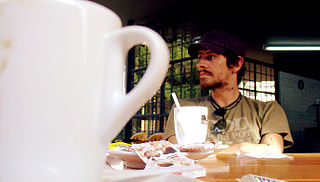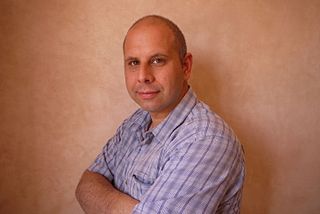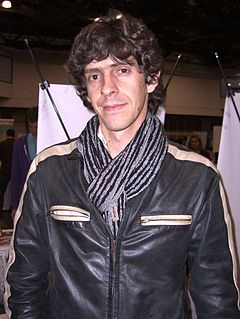A Quote by Michael Dirda
Once we know the plot and its surprises, we can appreciate a book's artistry without the usual confusion and sap flow of emotion, content to follow the action with tenderness and interest, all passion spent. Rather than surrender to the story or the characters - as a good first reader ought - we can now look at how the book works, and instead of swooning over it like a besotted lover begin to appreciate its intricacy and craftmanship. Surprisingly, such dissection doesn't murder the experience. Just the opposite: Only then does a work of art fully live.
Quote Topics
Action
Appreciate
Art
Artistry
Begin
Book
Characters
Confusion
Content
Dissection
Does
Emotion
Experience
First
Flow
Follow
Fully
Good
How
Instead
Interest
Intricacy
Just
Know
Like
Live
Look
Lover
Murder
Now
Once
Only
Opposite
Ought
Over
Over It
Passion
Plot
Rather
Reader
Sap
Spent
Story
Surprises
Surprisingly
Surrender
Swooning
Tenderness
Than
Then
Usual
Without
Work
Works
Related Quotes
Our great mistake in education is ... the worship of book-learning-the confusion of instruction and education. We strain the memory instead of cultivating the mind. ... We ought to follow exactly the opposite course with children-to give them a wholesome variety of mental food, and endeavour to cultivate their tastes, rather than to fill their minds with dry facts.
I think what's happening with book advances is something that most of the world just doesn't fully appreciate, especially when it comes to nonfiction, because writing a book of investigative journalism is an expensive endeavor, and the system works best if you have publishers making bets on authors.
I feel lucky that I read so many books as a kid because I know that no matter how much I appreciate a book now, and I can love a book very much, it's never going to be that childhood passion for a book. There's some element, something special about the way they're reading books and experiencing books that's finite.
Once I start work on a project, I don’t stop and I don’t slow down unless I absolutely have to. If I don’t write every day, the characters begin to stale off in my mind – they begin to seem like characters instead of real people. The tale’s narrative cutting edge starts to rust and I begin to lose my hold on the story’s plot and pace. Worst of all, the excitement of spinning something new begins to fade. The work starts to feel like work, and for most writers that is the smooch of death.
Every reader, as he reads, is actually the reader of himself. The writer's work is only a kind of optical instrument he provides the reader so he can discern what he might never have seen in himself without this book. The reader's recognition in himself of what the book says is the proof of the book's truth.
Our task is not to find the maximum amount of content in a work of art, mush less to squeeze more content out of the work than is already there. Our task is to cut back on content so we can see the thing at all. The aim of all commentary on art now should be to make works of art - and, by analogy, our own experience - more, rather than less, real to us.
There are many readers of the book, who don't know anything about the authors and the artists. There is more than one author. It doesn't matter, if you can't make the reader dive into the story and surround him with that environment and those characters. That's an experience that lasts longer than figuring out who did what. I think that's what makes our working relationship better, it helps us to make a book that feels unique and not like different voices.
Animation story boarding works differently than live action story boarding. The story crew along with a writer really does shape and create the film - the world and it's characters. We meet almost every day and brainstorm the plot of the film. It's a highly collaborative process - and we continue to improve the story until we literally run out of time.
Once in a very long time you come across a book that is far, far more than the ink, the glue and the paper, a book that seeps into your blood. With such a book the impact isn't necessarily obvious at first...but the more you read it and re-read it, and live with it, and travel with it, the more it speaks to you, and the more you realize that you cannot live without that book. It's then that the wisdom hidden inside, the seed, is passed on.
Character drives the story, and the story drives the book. I don't think about where the action should go, or how much there should be, until it's required by the characters. When I find myself adding conflict just because I'm afraid that the reader might get bored, I know I've taken a wrong turn somewhere.
With a 660-page book, you don't read every sentence aloud. I am terrified for the poor guy doing the audio book. But I do because I think we hear them aloud even if it's not an audio book. The other goofy thing I do is I examine the shape of the words but not the words themselves. Then I ask myself, "Does it look like what it is?" If it's a sequence where I want to grab the reader and not let the reader go then it needs to look dense. But at times I want the reader to focus on a certain word or a certain image and pause there.
The challenge is always to find the good place to end the book. The rule I follow with myself is that every book should end where the next book would logically begin. I know that some readers wish that literally all of the threads would be neatly tied off and snipped, but life just doesn't work that way.
A good book deserves an active reading. The activity of reading does not stop with the work of understanding what a book says. It must be completed by the work of criticism, the work of judging. The undemanding reader fails to satisfy this requirement, probably even more than he fails to analyze and interpret. He not only makes no effort to understand; he also dismisses a book simply by putting it aside and forgetting it. Worse than faintly praising it, he damns it by giving it no critical consideration whatever.
Everything that I spent my entire life dedicated to, which is this art of mentalism, of magic... I don't see it and feel it and experience it like I first did when I was getting involved in this art. I try to look at it as a spectator but unless I get amnesia I still can't overlook that. I can appreciate the performance but I would love to be fooled.




































